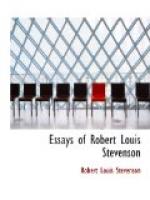Indeed, it is a memorable subject for consideration, with what unconcern and gaiety mankind pricks on along the Valley of the Shadow of Death. The whole way is one wilderness of snares, and the end of it, for those who fear the last pinch, is irrevocable ruin. And yet we go spinning through it all, like a party for the Derby.[8] Perhaps the reader remembers one of the humorous devices of the deified Caligula:[9] how he encouraged a vast concourse of holiday-makers on to his bridge over Baiae[10] bay; and when they were in the height of their enjoyment, turned loose the Praetorian guards[11] among the company, and had them tossed into the sea. This is no bad miniature of the dealings of nature with the transitory race of man. Only, what a chequered picnic we have of it, even while it lasts! and into what great waters, not to be crossed by any swimmer, God’s pale Praetorian throws us over in the end!
We live the time that a match flickers; we pop the cork of a ginger-beer bottle, and the earthquake swallows us on the instant. Is it not odd, is it not incongruous, is it not, in the highest sense of human speech, incredible, that we should think so highly of the ginger-beer, and regard so little the devouring earthquake? The love of Life and the fear of Death are two famous phrases that grow harder to understand the more we think about them. It is a well-known fact that an immense proportion of boat accidents would never happen if people held the sheet in their hands instead of making it fast; and yet, unless it be some martinet of a professional mariner or some landsman with shattered nerves, every one of God’s creatures makes it fast. A strange instance of man’s unconcern and brazen boldness in the face of death!
We confound ourselves with metaphysical phrases, which we import into daily talk with noble inappropriateness. We have no idea of what death is, apart from its circumstances and some of its consequences to others; and although we have some experience of living, there is not a man on earth who has flown so high into abstraction as to have any practical guess at the meaning of the Word life. All literature, from Job and Omar Khayyam to Thomas Carlyle or Walt Whitman,[12] is but an attempt to look upon the human state with such largeness of view as shall enable us to rise from the consideration of living to the Definition




